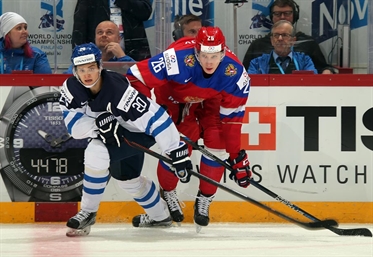Rematch
Rematch
Finland, Russia meet again, this time for gold

 HELSINKI, FINLAND - DECEMBER 28: Russia's Yegor Korshkov #26 and Finland's Sebastian Aho #20 battle during preliminary round action at the 2016 IIHF World Junior Championship. (Photo by Andre Ringuette/HHOF-IIHF Images)
HELSINKI, FINLAND - DECEMBER 28: Russia's Yegor Korshkov #26 and Finland's Sebastian Aho #20 battle during preliminary round action at the 2016 IIHF World Junior Championship. (Photo by Andre Ringuette/HHOF-IIHF Images)
When the two teams meet again, many things are the same, but many are also different. The biggest differences are the big young men standing in goal. Both coaches have had to take the starting job from the goalie they entered the tournament with, and hand it to the backup.
For Russia, the change was not exactly unexpected, as coach Bragin’s decision to go with Alexander Georgiev over Ilya Samsonov had raised some eyebrows. After all, Samsonov was Best Goaltender at the 2015 IIHF Ice Hockey U18 World Championship and was the Washington Capitals first-round draft choice last summer.
Bragin made the change after Denmark's quarter-final against Denmark, and it was Samsonov, who backstopped Russia to the final when he made 26 saves in the semi-final against the U.S., and 13 of them in the last period when the Americans were desperate to tie the game.
Or, as Alexander Mikulovich put it:
“He’s doing very good for us. He made a few good saves. I think he’s a pretty good goalie.”
As for Finland, coach Jalonen shortened Veini Vehvilainen’s leash as the games went on. He gave Kaapo Kahkonen the start after Finland’s losing game against Russia, but went back to Vehvilainen in the next two games. He finally gave Vehvilainen the hook in the game against Canada, and has been riding Kahkonen ever since.
One thing that has not changed is that Finland’s big line with Patrik Laine, Sebastian Aho, and Jesse Puljujarvi is still their most lethal weapon. The trio is 1-2-3 in tournament scoring, with Puljujarvi on top with 5+10=15 points. Aho has 12 points (4 goals) and Laine 11 points (6 goals).
The good news for Finland was that even if Sweden managed to shut them down in the semi-final, older players Mikko Rantanen and Kasperi Kapanen could step up and be the difference.
Russia, too, has got key goals from their key players at the right times. Vladislav Kamenev, who plays for the Milwaukee Admirals in the AHL, leads his team with four goals in the tournament. Three of them have been huge. In Russia’s all-too-close quarter-final against Denmark, he scored both the 3-3 goal with 44 seconds remaining in the third period, and the game-winner on OT. He also scored the go-ahead goal that gave Russia lead for the first time in the game against Finland.
Their leading scorer is Lokomotiv Yaroslavl’s Yegor Korshkov, with two goals and six assists. He scored the game-winner in the semi-final against Team USA.
While there is none of the cutesy media-driven shadow boxing as when Finland plays against Sweden, make no mistake, this is a rivalry, too. It’s such a rivalry that the two parties don’t even want to acknowledge the existence of the other one.
Maxim Lazarev was asked whether there’s a special feeling to meet their western neighbour.
“Nothing, nothing. We just need to be focused,” he said.
Radel Fazleyev went almost a step further when he was asked about the Laine-Aho-Puljujarvi line, and whether Russia has to be on their toes with them.
“I don’t even know who they are, I just know what they look like, the right-handed guy with the cage is really good, he has a good shot,” he dead-panned.
Not that the Finns had any deep analytical thoughts on the Russian team, that they wanted to share, either.
“If we play our game, we’re a tough team to beat,” said Aho.
There may be a bit of hockey history in the making.
One, Jukka Jalonen now has the chance to create a one-man Finnish Triple Gold Club, by becoming the first Finnish coach to have won both the World Championship and the World Junior Championship, and the Finnish championship. Two, Finland has the chance to be the first country not called Canada to win World Juniors on home ice – since 1998 when Finland won the championship.
Then, too, the final was played at Hartwall Arena - which was brand new - and like tonight, Finland played Russia in the final. Led by Olli Jokinen, and coached by Kasperi Kapanen’s grandfather, Hannu, Finland won the final with Niklas Hagman’s goal in OT.
Hannu Kapanen will be at the final on Tuesday, wearing the same lucky jacket he wore behind the bench in 1998, and should Finland win, the Kapanen family would also have a special club of their own with three gold medals: Two World Junior Championships, one as a player (Kasperi), another as a coach (Hannu), and also a World Championship gold (Sami, Kasperi’s father, 1995).
Russia did win the first game, and they have played well as a team in the tournament. A Russian win wouldn't be a huge upset. While Finland has the tournament's best power play, Russia has the best penalty kill.
"I think we have a huge character, which will help us. Finland doesn’t have too much like we are. Hopefully it’ll be a good game tomorrow," Mikulovich said.
But sometimes the stars simply align just right for a team and in this tournament, the stars seem to have aligned in a formation that has two right-handed guys wearing full cages on the wings and a babyfaced Harry Potter in the middle.
Back to Overview
















































